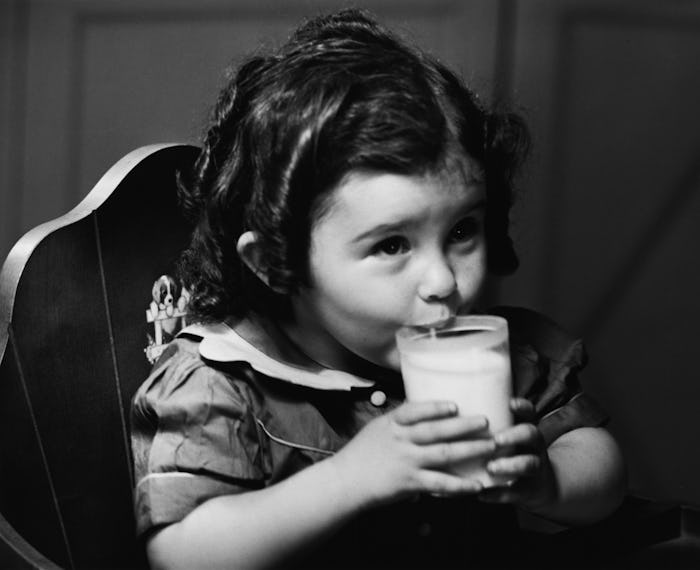Life

It Sounds Simple, But Will A Glass Of Warm Milk *Really* Help Your Kids Go To Sleep?
Take it from me: when your child doesn't sleep well, you're willing to try pretty much anything. I'm lucky that my daughter is a pretty great sleeper, but when she's teething or going through some sort of growth spurt and isn't getting as much rest as usual, I feel desperate. Luckily, there are tons of old wives' tales out there to try, like a glass of warm milk before bed. But does warm milk really help kids sleep, or this just some ancient piece of advice that sounds too good to be true?
It's weird to think that milk can put someone to sleep, even if it's warmed up, but this is a really popular belief. Dr. Florencia Segura, FAAP of Einstein Pediatrics, tells Romper that this is because milk contains an amino acid called tryptophan. When you eat tryptophan, your body turns it into niacin, a B vitamin that plays a key role in creating serotonin. Serotonin is a neurotransmitter that is associated with both sleep and melatonin levels, the hormone that controls your sleep cycles. The thought is that eating foods that contain tryptophan boosts production of serotonin and makes you sleepy (it's also in turkey, which is why many people say Thanksgiving dinner makes them tired).
It would be so great if something as easy and affordable as a glass of warm milk could put your kid to sleep. Unfortunately, it's not that simple. "Although there is no good evidence to show that a glass of warm milk itself will help induce sleep, if warm milk is part of a child’s bedtime routine, it theoretically could help children relax and therefore help them fall asleep," says Dr. Segura. In other words? Warm milk itself isn't going to be a miracle cure. Instead, it has to be part of a daily bedtime routine in order to work.
That's not a bad thing, it's just something you have to get them adjusted to. And, actually, it's a good idea to put a routine in place. Dr. Harvey Karp, pediatrician and founder and CEO of Happiest Baby, tells Romper, "Actually, routines are wonderful for little kids. They give a feeling of security and safety. So giving your baby a warm bottle every night may be a little boost of tryptophan and a comforting sleep cue signaling to them that it’s time for bed."
Plus, it's good for them. "We pediatricians recommend about 16 ounces of milk daily for important nutrients such as calcium, vitamin D, and protein," says Dr. Segura. So it relaxes them and gives them the nutrients they need, which is great.
There are a few things to keep in mind if you plan on trying this out. For one, you want to make sure your child is old enough for milk. "Most doctors recommend waiting for children to reach their first birthday before introducing cow’s milk," says Dr. Karp. "Before then, we recommend a warm bottle of breast milk or formula."
Another thing to remember is that you shouldn't give them milk and then put them right to sleep without having them brush their teeth first. "Milk can create cavity-producing bacteria," says Dr. Segura.
Oh, and be careful about actually heating the milk. "Caution must be exercised when heating the milk," Dr. Segura adds. "We recommend heating milk in a small saucepan on a stove top with frequent stirring, as microwaving milk can distribute heat unevenly, increasing the chances of burns. Be sure to always test a few drops of warmed milk on your wrist to assess temperature."
If warm milk isn't working or your child just doesn't seem to want it, there are other things you can incorporate into a routine to help your child fall asleep. Dr. Segura recommends "singing your child a lullaby, playing soothing music, taking a warm bath, or letting your child bring their favorite blanket, toy, or stuffed animal into bed. Loveys, like a blanket or a teddy bear, are called transitional objects as they are stepping stones towards independence, giving children comfort and courage to take steps away from their mom or dad as they continue to grow."
Dr. Karp recommends adding some white noise to their bedroom to get them relaxed and sleepy. "Ever notice how many people fall asleep on long car or plane rides? Low rumbly white noise is a wonderful sleep aid. Think of it like a cuddly teddy bear — but made out of sound," he explains. "Rumbly white noise reminds babies of the sounds they heard in the womb and helps to activate the Calming Reflex, one of the brain’s very ancient relaxation centers. It can also be a soothing sleep cue for older kids… and adults." So maybe skip the milk and put on some low sounds instead.
Experts:
Dr. Florencia Segura, MD, FAAP of Einstein Pediatrics
Dr. Harvey Karp, pediatrician and founder and CEO of Happiest Baby
This article was originally published on